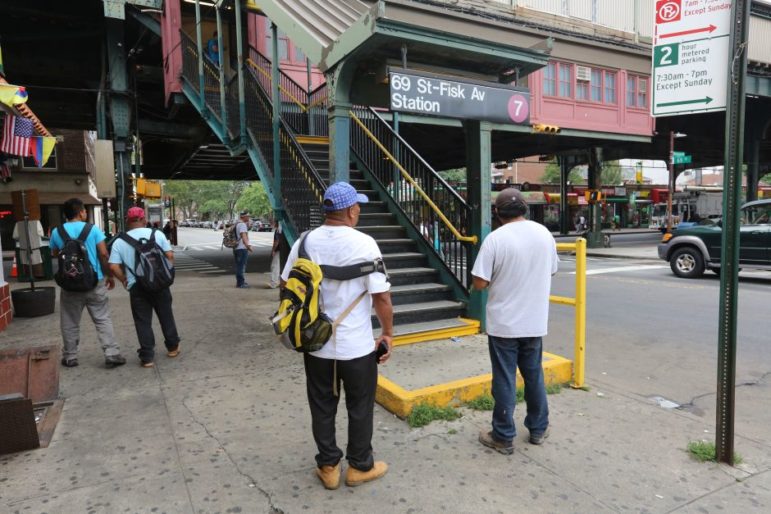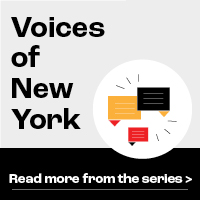
El Diario
Day laborers chase opportunities on Queens’ streets. (El Diario)Read the original story in Spanish at El Diario
Translated and condensed by Carlos Rodríguez Martorell
The spread of the coronavirus (COVID-19) could mean additional agony for hundreds of day laborers, mostly Latin American immigrants, who stand on the corner of 69th Street and Roosevelt Avenue in Queens and other points throughout the city every morning – and now on social media as well – in the hope of scoring temporary work.
The story of Edgar Marino, a 44-year-old Colombian immigrant, is representative of the possible scenarios worrying construction and domestic service workers, in light of the havoc the new virus could bring.
“For the last six years, we New York day laborers had already been feeling the weight of the abuse carried out by some employers who take advantage of the workers’ need and pay us below the legal wage, as well as a drop in temporary work opportunities,” said Marino, who is also an activist with the New Immigrant Community Empowerment (NICE) coalition. “More than [contagion] fears, what this virus could cause is an economic depression that would further diminish opportunities for the working class.”
José, 55, an undocumented worker from Mexico who every morning tries to find “a gig that will get me through the day,” both online and at the “parada” on Roosevelt Avenue, said that contractors who hired him last week had cancelled a number of demolitions in Manhattan where he was scheduled to work.
“It was already bad because employers are starting to be scared of hiring undocumented people,” said José. “Now, with this disease that popped up, many of the smaller jobs are falling through. Having survived through so many things, I can’t be afraid of this, but if I do not work for another week, I will not be able to pay my rent. The coronavirus may not kill me, but the lack of work will.”
At the headquarters of NICE, a community-based organization that every morning helps hundreds of day laborers connect with job opportunities, it is evident that here, fear of the virus is different.
NICE staff member José Payares said that there does not seem to be widespread panic about the disease, but rather about of the effect it may have on the economy.
“A deceleration of commercial activity, of services, of construction, the city forcing people to isolate and preventing them from being in public spaces the way other countries have done, that is what really causes fear, because that implies that there will be no temporary work either,” said Payares.
Worker organizations based in Queens, Brooklyn and Staten Island estimate that between 8,000 and 10,000 men and women step out into the street every day to earn a living as day laborers.
“We have no health insurance, but that is the least of it because they will not refuse to treat you here. That you can work out, but if there is a bigger epidemic, they will send us day laborers home because there is no activity. That is the same as sending us to our deaths,” said Cruz, who has been a day laborer since he left his native Puebla 10 years ago.
NICE Deputy Director Claudia Zamora said that, even before the first cases of the coronavirus emerged in New York, the organization has been distributing safety and hygiene information to the hundreds of people who visit their offices every day seeking support to find work. In 2019, NICE reported welcoming some 7,500 people between the hours of 7 and 11:30 a.m. The opportunities available generally consist of a few hours of work per day.
“We post the messages sent by the Department of Health on our social media accounts so people can take minimal hygiene measures, but we also try to establish new sanitary ways to greet and have contact because, as you know, we Latin Americans are used to having close physical interaction,” said Zamora.
She also insisted that immigration status and lacking insurance are not obstacles for obtaining health services if people present symptoms of coronavirus, or any other disease.
“This is one of the concerns that the workforce has already overcome,” said the community organizer.
For their part, the Queens-based International Ecuadoran Alliance (Alianza Ecuatoriana Internacional, or AEI), which offers information sessions and Occupational Safety and Health Administration (OSHA) certifications, are using new resources to spread information about prevention and management of COVID-19 in the workplace.
“We have been distributing information on preventive measures for several weeks to the hundreds of people coming to our construction site safety classes. As you know, it is very hard for anyone to find work without those,” said Aida Illisaca, from the AEI.
Temporary worker Angélica Peña arrived in New York a year ago from Venezuela and checks for job offers early every morning. The concerns she expresses have nothing to do with getting the virus. Like many fellow day laborers, she says that the winter season was “terrible” and that everyone who is looking for work is extremely worried.
“The possibility that they start closing places because of the coronavirus at a time when job offers have dropped this much is a terrible scenario. Where will I go to work?” said Peña. “I am in shock because I am looking for work that usually pays between $160 and $180 per demolition, and now they are paying $100. We were already worried about abusive employers.”








